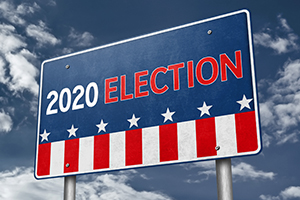 The good news is there won’t be a considerable impact on commercial real estate regardless of the presidential election outcome. The ramifications of the presidency will take several years to play out in CRE. Let’s take a closer look at how the presidency may eventually affect commercial real estate.
The good news is there won’t be a considerable impact on commercial real estate regardless of the presidential election outcome. The ramifications of the presidency will take several years to play out in CRE. Let’s take a closer look at how the presidency may eventually affect commercial real estate.
How Elections Can Affect CRE
Traditionally, commercial real estate experiences its lowest appreciation rates in the months before an election. But once investors and buyers heave a collective sigh, the year following a presidential election is often the most prosperous for the real estate industry.
CRE has performed similarly under Republican and Democratic administrations for over 40 years, so a new president may not create significant change.
Joe Biden discussed increasing taxes on Americans who make more than $400,000 a year, which may spook CRE investors into leaving some states. Businesses are also still trying to recover from the first wave of COVID-19 shutdowns.
1031 Exchanges And Opportunity Zones
The 1031 exchange program and opportunity zones serve as incentives that attract commercial real estate investors.
1031 exchange: The IRS allows investors to exchange “like-kind” investment properties and defer capital gain taxes. There are no limits on the frequency of 1031 exchanges. Policy changes may result in the program’s elimination as investors leave the program.
 Opportunity zones: OZs encourage CRE buyers to invest in economically disadvantaged areas. They also allow investors to completely defer capital gain taxes if they’ve owned the property for ten years. OZ reform may require stricter reporting of the investor’s impact on residents.
Opportunity zones: OZs encourage CRE buyers to invest in economically disadvantaged areas. They also allow investors to completely defer capital gain taxes if they’ve owned the property for ten years. OZ reform may require stricter reporting of the investor’s impact on residents.
Administration Policy Changes
These policies vary among administrations, but their long-term effects could have far-reaching impacts on commercial real estate.
Cap rate fluctuation: Higher cap rates are more favorable for commercial investment returns. However, a presidential administration can implement new policies that alter interest rates and change property cap rates.
Tax deductions and credits: New tax deductions and credits – or the elimination of existing policies – can shape a CRE investor’s operating costs. They can also positively or negatively change cap rates.
Trade policies: Trade regulations with certain countries can economically disrupt industries and entire geographic regions. If a market goes belly up, the real estate in the area will likely follow.
DRK and Company are committed to keeping our clients up to date on the latest industry trends. Contact the team at DRK and Company to learn more about local investment opportunities.
Until next time,

